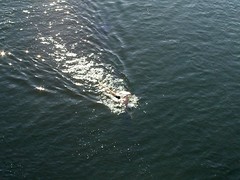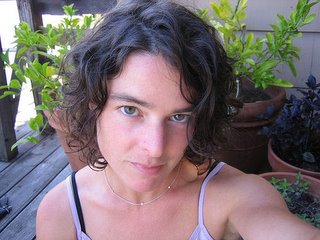identity crisis
Another trip to campus, another opportunity to revisit the ol' identity crisis. For, as I discuss my dissertation with my advisor while Axel reads his board book in the stroller next to me, I am supremely conscious of the need to self-edit. Generally, in Axel's company, we have a running dialogue; I describe our surroundings and actions, he contributes his all-time favorite word, "cat," or other exclamations (wow! ok! alright! oh wow! dat? dis!), or he tries out the new words he hears (be-rah, rwaihn, a-plane). I've noticed, in the company of others, that this behavior falls squarely in the "mommy to so-and-so" pigeon-hole of motherhood: those women who disappear completely into their children's lives, to the point that their name is actually hyphenated with their child's. A group I've always mocked and found slightly scary.
So, as I sit opposite my committee advisor, talking too fast about work she hasn't yet seen, I am intensely aware of Axel's unanswered contribution to our conversation. I know better than to interrupt the adult conversation to respond to him, yet I feel that on some level, I'm doing him a disservice. And while I wouldn't describe my feelings as being "torn," I am acutely aware of the multiple s elves jostling one another in the too small and too hot room.
elves jostling one another in the too small and too hot room.
The semester Axel was born, I returned to teaching when he was four weeks old. It was pretty horrible trying to juggle nursing every other hour with grading papers, lesson planning and clothes free from milk stains. I was very tired. But: I drew immense pride from the fact that I did it, that I managed to maintain my professional self and mother a newborn.
And, more importantly, I drew immense satisfaction from incorporating Axel into my campus routine. Many days, Axel came to campus with me, hanging out with our fabulous administrative team while I was in the classroom, and hanging out in my office while I held office hours. I loved that students could see me discussing theory while holding a baby. Because there are too few female professors with children in these ivoried halls. And it is perhaps for this reason alone--to model academic mother--that I keep on keeping on.
So, as I sit opposite my committee advisor, talking too fast about work she hasn't yet seen, I am intensely aware of Axel's unanswered contribution to our conversation. I know better than to interrupt the adult conversation to respond to him, yet I feel that on some level, I'm doing him a disservice. And while I wouldn't describe my feelings as being "torn," I am acutely aware of the multiple s
 elves jostling one another in the too small and too hot room.
elves jostling one another in the too small and too hot room.The semester Axel was born, I returned to teaching when he was four weeks old. It was pretty horrible trying to juggle nursing every other hour with grading papers, lesson planning and clothes free from milk stains. I was very tired. But: I drew immense pride from the fact that I did it, that I managed to maintain my professional self and mother a newborn.
And, more importantly, I drew immense satisfaction from incorporating Axel into my campus routine. Many days, Axel came to campus with me, hanging out with our fabulous administrative team while I was in the classroom, and hanging out in my office while I held office hours. I loved that students could see me discussing theory while holding a baby. Because there are too few female professors with children in these ivoried halls. And it is perhaps for this reason alone--to model academic mother--that I keep on keeping on.





